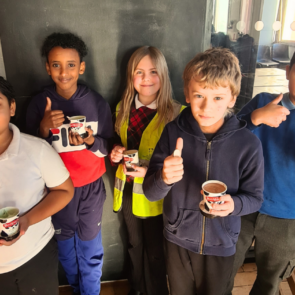 Mark Rosenblatt is the director of Waiting for Godot this autumn. Former Associate Director of West Yorkshire Playhouse, Mark will lead a team of local and national artists to bring Tobacco Factory Theatres’s first major solo production to the Factory Theatre. We caught up with him at the start of rehearsals.
Mark Rosenblatt is the director of Waiting for Godot this autumn. Former Associate Director of West Yorkshire Playhouse, Mark will lead a team of local and national artists to bring Tobacco Factory Theatres’s first major solo production to the Factory Theatre. We caught up with him at the start of rehearsals.
Waiting for Godot has often been classed as one of the most important plays of the 20th century. Do you agree?
There aren’t many plays that make a splash in popular culture. Even if you’ve never seen or read it, the Chaplinesque bowler hats, the conceit of eternally waiting for this guy Godot, even knowing that it’s the play where ‘nothing happens’ – all these hallmarks are not just familiar, they’re really well-known. I think that tells you how much of an impact the play has made.
Now I’ve had a chance to really dig into it, I understand why. It’s a high-wire act and yet it is written with such certainty and confidence, so precisely and with such brilliant comic patterns. It manages to place a foreground of music hall riffs against a backdrop of deep tragedy and despair and it plays with the biggest universal ideas – hope, trying hard to get through life, filling time, purpose, wondering what it all means and how we use and abuse relationships. And yet, somehow – and I think this is where its magic really lies – it manages to do so in a way which resists explaining itself. It’s rich and specific and inexplicably about everything and nothing.
What can audiences expect from your interpretation?
A portrait of friendship in all its tenderness and cruelty. Laughter. The intimacy of Tobacco Factory Theatres in the round.
Have you taken the action into a particular space and time, or left things up to audience interpretation?
It’s open. Our design is deliberately ambiguous but hopefully fires up some associations for the audience. It will feel simple, stripped back, modern, but with nods to the past.
How would you introduce the play for someone who has never heard of it?
It’s a play about a tetchy friendship between two vagrants, stuck in some kind of Groundhog Day loop, meeting in the same place day after day in the hope of getting something – a job? something more? – from a landowner called Mr Godot. They can’t remember everything, maybe their memories are going – were they here yesterday, is this the right tree? – and if they don’t stop finding stuff to do – anything – they might have to face the silence and the memories of what they have been running from – or is it towards? – all these years.
Do you think Waiting for Godot is still relevant to 21st century audiences?
Absolutely yes. Who the hell knows what story, if any, makes sense of this life? Is there a heaven or does it end with mud and bone. And how do you cope with that uncertainty? Make each other laugh. Find stuff to do. Earn money. Eat. It’s all absurd.
How do you make this kind of work accessible to a 2017 audience?
Explore it deeply – make it tender, cruel, silly and deep. We’re all like those things – full of contradictions. The play needs to mirror us and hopefully it’ll feel like it connects.
What is your favourite moment in the play?
When Vladimir & Estragon finally work out that the only way to stop Pozzo falling down is to hold him up.
There has been much controversy in Bristol and across the US recently regarding the issue of slavery, particularly in regard to monuments and place names. How do you think a modern audience will respond to the character of Lucky the slave, and his master Pozzo?
It’s shocking, no doubt. But the longer you spend with them, the more you realise how these two people can’t let each other go. The bind between master and slave, in this play, is complex and full of twisted love. It doesn’t make it right. It just makes it complicated.
How did you become a director, and do you have any advice for somebody hoping to follow a similar path?
I directed at school and university and won a competition when I started out which helped me break through. I wrote to established directors and asked if I could meet them. A couple let me assist them. I was lucky to have a couple of people who championed me. I set up my own company so I wasn’t reliant on freelancing. I huffed and puffed. I still do.
Advice-wise, crikey. It’s not really a career in any traditional sense. It’s more like one thing after another. The money’s mainly terrible. You need to be resourceful and tenacious and keep working out what you want to do and not try to mimic others. And keep at it, and keep at it, and keep at it.
What is your favourite theatrical work, and why?
The Three Lives of Lucie Cabrol by Complicite. I saw it when I was at school. It was unlike anything I’d ever seen. Visceral, physical, brutal, tender. I didn’t think theatre could be like that. It felt like seeing the dark side of the circus.
Do you have any other exciting productions coming up this year?
I’ve just made a show in New York with an amazing composer/performer called Heather Christian. It’s playing right now in Brooklyn and is a new piece about her relationship with the dead (she talks to them) and finishes with a blues Requiem Mass performed with a 30 strong community choir.
And I’m about to direct Frank McGuinness’ adaptation of De Profundis, Oscar Wilde’s amazing letter from jail to his ex Bosie. It’s a one man show and will play at the Vaudeville Theatre in the West End in January.
A version of this interview originally ran in the October 2017 issue of The Bristol Magazine. With thanks to The Bristol Magazine for the questions.
Waiting for Godot runs at Tobacco Factory Theatres from Thu 19 October – Sat 04 November. For more information and to book visit the main show page.
Posted on 26 September 2017



